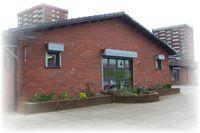|
Home page
My city
Do you like reading? - questionnaire
Results of reading questionnaire
Hogmanay
Drama club
The Wavel Dragon - script
My favourite character i European literature
Character profile
Character Profile - Amy
Character Profile by kayleigh sinclair
CHARACTER PROFILE by lauren o'hare
Photo
Winter and Christams proverbs
THE NIGHT BEFORE CHRISTMAS
|

About us
Kilbowie Primary is a non-denominational, co-educational school which accepts children from Primary 1 to Primary 7 (5-11 years). It is set in an urban area about 9 miles from the city of Glasgow.
It is located in the town of Clydebank which is in the district of West Dunbartonshire which is on the north of the River Clyde. Clydebank served as an early housing scheme for several shipyards and also for the American Singer Company which opened around 1884.
In 1941, the town was largely destroyed in the Clydebank Blitz. Clydebank is presently, the home to half of all the people who live in the district of West Dunbartonshire and has a population of 45 000
Who work here?
The Kilbowie family consists of 340 children, 14 class teachers, 2 probationary teachers (new teachers), and 9 learning assistances. In addition there are 3 members of the office staff, 6 kitchen staff, and 1 janitor. We are managed by 1 head teacher, a deputy head teacher and acting depute head teacher.
What do we believe?
We see ourselves as a family. We look after each other and care about each other. We also care about the environment and the world that we and the rest of the world live in. We want to live in a world which is clean, sustainable and where everyone has access to clean water and enough food to eat.
How we work?
Kilbowie Primary School, as all Scottish schools, is in the midst of a curriculum transition period The former 5-14 Curriculum is being replaced by the Curriculum for Excellence which focuses on learners from the 3-18. The Curriculum for Excellence (CfE) is built on notions of truth, compassion, wisdom and justice and endeavour to educate young citizens to become Successful Learners, Responsible Citizens, Confident Individuals and Effective Contributors capacities. One of the things which is different is that children are much more involved in their own learning making their own targets and monitoring their success.
|

